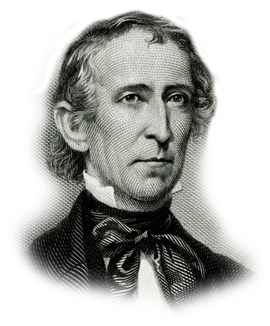|
|
Messages and Papers of John Tyler
Contents:
Messages and Papers of
JOHN TYLER
April 4, 1841, to March 4, 1845

JOHN TYLER, second son of Judge John Tyler, governor of Virginia from 1808 to 1811, and Mary Armistead, was born at Greenway, Charles City County, Va., March 29, 1790. He was graduated at William and Mary College in 1807. At college he showed a strong interest in ancient history; was also fond of poetry and music, and was a skillful performer on the violin. In 1809 he was admitted to the bar, and had already begun to obtain a good practice when he was elected to the legislature. Took his seat in that body in December, 1811. Was here a firm supporter of Mr. Madison’s Administration; and the war with Great Britain, which soon followed, afforded him an opportunity to become conspicuous as a forcible and persuasive orator. March 29, 1813, he married Letitia, daughter of Robert Christian, and a few weeks afterwards was called into the field at the head of a company of militia to take part in the defense of Richmond, threatened by the British. This military service lasted but a month. He was reelected to the legislature annually until, in November, 1816, he was chosen to fill a vacancy in the United States House of Representatives. Was reelected to the Fifteenth and Sixteenth Congresses. In 1821, his health being seriously impaired, he declined a reelection and retired to private life. In 1823 he was again elected to the Virginia legislature. Here he was a friend to the candidacy of William H. Crawford for the Presidency. In 1824 he was a candidate to fill a vacancy in the United States Senate, but was defeated. He opposed in 1825 the attempt to remove William and Mary College to Richmond, and was afterwards made successively rector and chancellor of the college, which prospered signally under his management. In December, 1825, he was chosen by the legislature to the governorship of Virginia, and in the following year was reelected by a unanimous vote. In December, 1826, the friends of Clay and Adams combined with the Democrats opposed to John Randolph and elected Mr. Tyler to the United States Senate. In February, 1830, after taking part in the Virginia convention for revising the State constitution, he returned to his seat in the Senate, and found himself first drawn toward Jackson by the veto message (May 27) upon the Maysville turnpike bill; supported Jackson in the Presidential election of 1832, but broke with the Administration on the question of the removal of the deposits from the UnitedStates Bank, and voted for Mr. Clay’s resolution to censure the President. He was nominated by the State-rights Whigs for Vice-President in 1835, and at the election on November 8, 1836, received 47 electoral votes; but no candidate having a majority of electoral votes, the Senate elected Richard M. Johnson, of Kentucky. The legislature of Virginia having instructed the Senators from that State to vote for expunging the resolutions of censure upon President Jackson, Mr. Tyler refused to obey the instructions, resigned his seat, and returned home February 29, 1836. On January 10, 1838, he was chosen president of the Virginia Colonization Society. In the spring of 1838 he was returned to the Virginia legislature. In January, 1839, he was a candidate for reelection to the United States Senate; the result was a deadlock, and the question was indefinitely postponed before any choice had been made. December 4, 1839, the Whig national convention, at Harrisburg, Pa., nominated him for Vice-President on the ticket with William Henry Harrison, and at the election on November 10, 1840, he was elected, receiving 234 electoral votes to 48 for Richard M. Johnson, of Kentucky. By the death of President Harrison April 4, 1841, Mr. Tyler became President of the United States. He took the oath of office on April 6. Among the more important events of his Administration were the "Ashburton treaty" with Great Britain, the termination of the Indian war in Florida, the passage of the resolutions by Congress providing for the annexation of Texas, and the treaty with China. On May 27, 1844, he was nominated for President at a convention in Baltimore, but although at first he accepted the nomination, he subsequently withdrew his name. On June 26, 1844, Mr. Tyler married Miss Julia Gardiner, of New York, his first wife having died September 9, 1842. After leaving the White House he took up his residence on his estate, Sherwood Forest, near Greenway, Va., on the bank of the James River. Was president of the Peace Convention held at Washington February 4, 1861 Afterwards, as a delegate to the Virginia State convention, he advocated the passage of an ordinance of secession. In May, 1861, he was unanimously elected a member of the provisional congress of the Confederate States. In the following autumn he was elected to the permanent congress, but died at Richmond January 18, 1862, before taking his seat, and was buried in Hollywood Cemetery, in that city.
Contents:
Chicago:
John Tyler, "Title Page," Messages and Papers of John Tyler in 1889. Original Sources, accessed November 2, 2025, http://www.originalsources.com/Document.aspx?DocID=BPRQCKAPTS2M6Q2.
MLA:
Tyler, John. "Title Page." Messages and Papers of John Tyler, in , page 1889. Original Sources. 2 Nov. 2025. http://www.originalsources.com/Document.aspx?DocID=BPRQCKAPTS2M6Q2.
Harvard:
Tyler, J, 'Title Page' in Messages and Papers of John Tyler. cited in , , pp.1889. Original Sources, retrieved 2 November 2025, from http://www.originalsources.com/Document.aspx?DocID=BPRQCKAPTS2M6Q2.
|